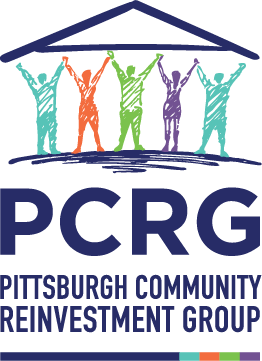OUR CHARGE
Pittsburgh Community Reinvestment Group 2019-20 Charge from Membership
Based upon one-on-one meetings conducted with membership PCRG has developed the following Advocacy and Policy Agenda for the next year
Capital & Finance
Defend against escalating attacks on the Community Reinvestment Act, Consumer Financial Protection Bureau, HMDA reporting requirements expansion
Provide more education on the benefits of CRA, use it to build more benefits agreements with banks
Fight efforts to relax payday lending laws in Pennsylvania.
Advocate for increased bank lending into low-moderate income communities and communities of color
Advocate for diversified sources to sustain and grow the Pittsburgh Housing Opportunity Fund
Enhance the County-level affordable housing trust fund, make it more accessible to members and their communities:
Understand allocations on an annual basis
Understand and promote its further capitalization
Advocate for increased State funding for Main Street and other Keystone Communities programs
Affordable Housing Tax Credit, uncap State RETT for State HTF
Membership
Utilize PCRG communications plan to increase targeted interactions with members and affiliate groups (i.e., update distribution lists, newsletter frequency, social media & website, PCRG membership packet)
Increase member participation within workgroups (i.e. VPWG, Developer’s Roundtable, CBCC/MBCC, GoBurgh)
Develop PCRG member organization and Board Member onboarding/welcome packet and “How To Use PCRG” guide
Grow more intentional and sustained member base
Continuation of County member agenda
Enhance the County-level affordable housing trust fund (HTF)
i. Understand annual allocations
ii. Understand and promote further capitalization of HTF
Enhance member capacity through programs like VISTA, Reimagining Communities Initiative, and continual technical assistance and training
Increase VISTA site placement from 10-13 within the year
Land & Housing
Advocate for an effective, community-centered transition of the Pittsburgh Vacant Property Reserve into the Pittsburgh Land Bank and ensure that members’ property recycling needs are met within the new system.
Assist County members in accessing, repurposing land via the County Tri-COG Land Bank
Educate development industry on how and where to create truly affordable housing
Advance zoning/policy changes to encourage siting of affordable housing near frequent transit, in proximity to opportunities. Encourage new multi-unit mixed-use projects in high-transit areas.
Educate banks on CLTs, their role in preservation process through homeownership opportunities
Based on the outcomes of the Lawrenceville IPOD, advance inclusionary zoning implementation within the city, call on Planning and Council to deliver
Assist developers in the production of affordable housing using the 4% Low-Income Housing Tax Credit; explore opportunities for “twinning” it with the 9% credit
Advocate for the creation of a State Housing Tax Credit to augment PHFA’s affordable housing financing
Uncap the State Real Estate Transfer Tax’s payment into the State Housing Trust Fund, adding $40-$50 million/yr to the Fund
Mobility & Transportation
Ensure that new mobility choices like micro-transit, e-scooters, and transportation network companies augment mass transit’s capabilities rather than cannibalize them.
Ensure that new mobility choices like micro-transit, e-scooters, and transportation network companies provide equal levels of service to low-moderate income communities and communities of color as middle/upper income and white communities.
Advance zoning/policy changes to encourage siting of affordable housing near frequent transit, in proximity to opportunities. Encourage new multi-unit mixed-use projects in high-transit areas
Advocate for more capital investment in pedestrian, transit, and biking upgrades, especially in low/moderate-income communities, to create greater mobility equity
Continue pushing for a strategic, long-range plan for transit expansion and improvement, including funding
Ensure that communities’ needs are represented and heard in the upcoming Port Authority long-range plan
Affordable housing
State Trust Fund ( $25 mil cap to $50 mil)
Integrate into Developer Roundtable discussion
Build understanding with members for state advocacy efforts
Find impact data (Alix)
HOF funding resources (Policy Team + Ernie & Alyssa)
managing expectations of the Board
More heavily resourced/oversaturated product
Prioritize community feedback/consensus building
Coordinate with Pittsburgh United (Alyssa + Alix <3)
Housing preservation strategies
State housing tax credit
Land Bank/reserve
Share testimonies with membership
County-wide strategy on Affordable Housing
Bank Trends
PCRG banking agenda?
Branch closures, CRA, GSE/Secondary market
CDFI capacity within Affordable Housing
Member engagement: Best ways to communicate with members (i.e. work groups, policy charge, newsletter, etc.)
Transit
Southwestern PA Commission 10-year Transportation plan
Build education/information platform on website
Member discussion part of membership meeting
Port Authority Strategic long term plan
Build education/information platform on website
Member discussion part of membership meeting
Additional items?
Additional RCO conversations (reached out to Hill CDC; listen to coalition conversations)
City planning/Mayor’s Office debrief of RCO (Andrew Dash, Ray Gastil & Majestic Lane)
Getting ahead of the renewal process (May 2020)
Opportunity Zones: how do we support our members?
Integrate into Developer Roundtable discussion – Jonnet Solomon (PNC Bank)
Decision-making based on membership (issue based vs. capacity)
